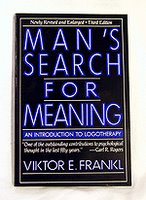 I am sitting at a neighborhood Starbucks after work. In other words, not at the usual bookstore. Tonight, at my usual roost, they are having their Christmas party, and I don’t feel like being in the midst of such hoopla!
I am sitting at a neighborhood Starbucks after work. In other words, not at the usual bookstore. Tonight, at my usual roost, they are having their Christmas party, and I don’t feel like being in the midst of such hoopla!So I’m sitting here thinking of Viktor Frankl....
The book shown here, Man’s Search For Meaning, is definitely one of the most profoundly important books I have ever encountered.
Viktor Emil Frankl, M.D., Ph.D. was Professor of Neurology and Psychiatry at the University of Vienna Medical School. I remember when the newspaper reported his death (Sept.2, 1997). I cut out the clipping and affixed it to the inside cover of my copy of Man's Search. It is impossible to read him and be unaware of the great genius of this man.
An American doctor once asked Viktor Frankl to explain the difference between conventional psychoanalysis and logotherapy. Before answering, Frankl asked the doctor for his definition of psychoanalysis.
The man said, "During psychoanalysis, the patient must lie down on a couch and tell you things which sometimes are very disagreeable to tell."
Frankl immediately replied by saying: "Now, in logotherapy the patient may remain sitting, but he must hear things which sometimes are very disagreeable to hear."
By this he meant that in logotherapy the patient is actually confronted with and reoriented toward the MEANING of his life. The role of the therapist, then, is to help the patient discover a purposefulness in his existence.
Frankl's theory is that man's search for meaning is the primary motivation in his life and not a "secondary rationalization" of instinctual drives. Whereas Freudian psychoanalysis focuses on the "will to pleasure" and Adlerian psychology focuses on the "will to power" it can be said that Frankl's logotherapy focuses on the "will to meaning."
Does man give in to to conditions or stand up to them? According to Frankl, the strength of a person's sense of meaning, responsibility, and purpose is the greatest determining factor in how that question will be answered. He believed that "man is ultimately self-determining" and as such, "does not simply exist but always decides what his existence will be, what he will become in the next moment."
 The first (and largest) section of this book is the searing autobiographical account of the author's experience as a prisoner in a concentration camp. He spent three years at Auschwitz and Dachau. These camps claimed the lives of his father, mother, brother, and wife. Frankl's survival and the subsequent miracle of this book are a testimony to man's capacity to rise above his outward fate.
The first (and largest) section of this book is the searing autobiographical account of the author's experience as a prisoner in a concentration camp. He spent three years at Auschwitz and Dachau. These camps claimed the lives of his father, mother, brother, and wife. Frankl's survival and the subsequent miracle of this book are a testimony to man's capacity to rise above his outward fate.As Gordon W. Allport states in the preface, "A psychiatrist who personally has faced such extremity is a psychiatrist worth listening to."
I agree, and highly reccommend this book.
As the sub-title says, it is an "introduction" to logotherapy, and anyone who wants to go deeper into the principles and practical application of Frankl's existential psychiatry should go to his excellent book entitled The Doctor And The Soul. Or you can read more about Frankl and his ideas here, at the site that commemorates and elaborates upon his groundbreaking work.
Frankl was fond of quoting Nietzsche's dictum..."He who has a WHY to live can bear with almost any HOW."
I read this book in my English class as a high school freshman. My teacher unfortunately did a horrible job at teaching it and I ended up thinking it was a stupid book. But it has been a long time since high school so maybe I will have to try it again sometime.
ReplyDeleteWhat a profound quote-the book is already on my Amazon list but I've not yet read it-I think I'll order it for myself..one of my twins bought a book called Milkweed by Jerry Spinelli today at the school bookfair-serendipitously about a young orphan boy in Nazi Germany....Two of my uncles and my late father-in-law were POWs in WWII, and my Jewish grandfather immigrated during that time. Whenever things seem overwhelming, all I have to do is think of them and all those who did not survive to gain instant perspective.
ReplyDeleteI am so glad that both of you (Stefanie - Cleo) are aware of this book and have plans to read and/or re-read it. I know that I will re-read it.
ReplyDeleteYou know, my beautiful Beacon Press hardcover edition (not the one shown on the blog) says on the front cover Named one of the ten most influential books in America in the 1991 Library of Congress Book-of-the-Month Club "Survey of Lifetime Readers"
If that blurb isn't impressive in itself, the name of that book club sure is!
I want to read a biography of Frankl one day, and this book, over again.
I concur; amazing book. My husband got me to read it; he's been fascinated with Frankl and his life story for a long time.
ReplyDelete